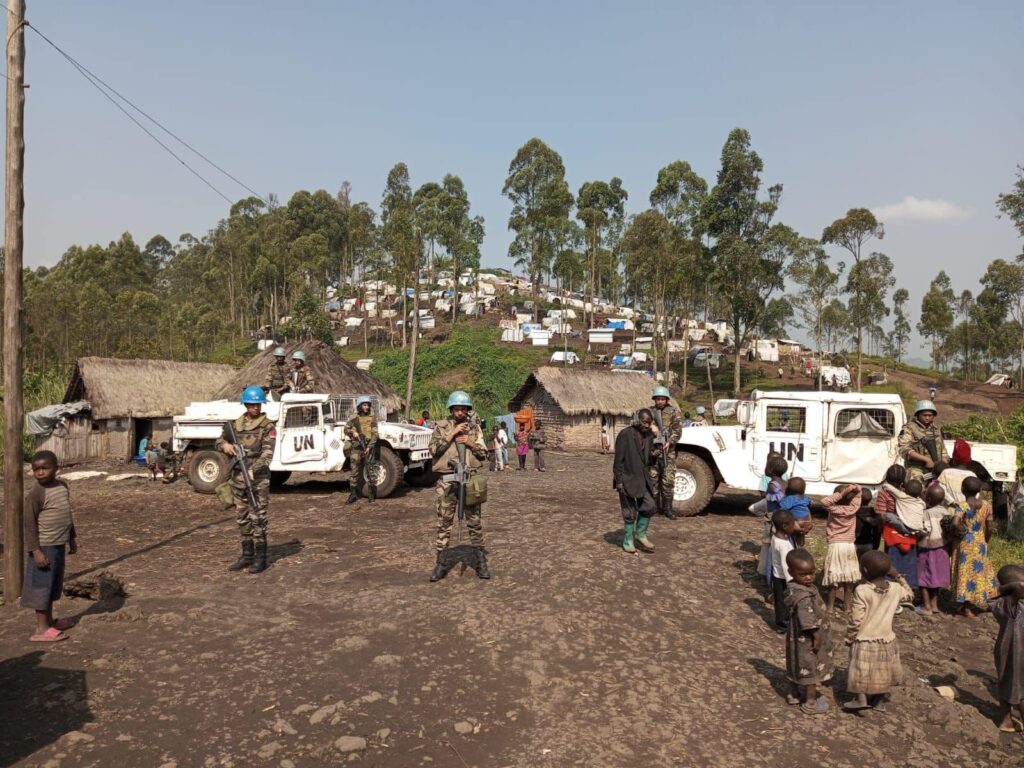ADF STAFF
Thousands of United Nations peacekeepers have maintained a consistent presence in the restive eastern region of the Democratic Republic of the Congo (DRC) for more than 23 years.
Unable to solve the deeply rooted violence that necessitated the mission, known as MONUSCO, the blue helmets are pulling out now. Mission chief Bintou Keita announced on January 13 that 2,000 peacekeepers will withdraw as part of the first phase of ending the mission.
“We have a ceiling of 13,500 troops authorized by the Security Council,” she said during a joint news conference with government officials. “As of April 30, with the start of the withdrawal underway, we will reach 11,500.”
Originally scheduled to shutter the mission by the end of 2025, the U.N. agreed to the DRC government’s request for an accelerated withdrawal and now expects to complete the third and final phase of MONUSCO’s withdrawal by December 31, 2024.
“We continue to work closely with Congolese authorities to accelerate the progressive and responsible disengagement of the peacekeeping mission from South Kivu while consolidating the peace gains,” U.N. spokesperson Stephane Dujarric said in a statement.
“The first phase of the disengagement of MONUSCO has begun and will lead to the complete withdrawal of MONUSCO from South Kivu by June 2024, together with the simultaneous strengthening of state authorities in the province,” said Dujarric. “During this phase, our peacekeeping colleagues’ bases in South Kivu will be handed over to the government.”
As MONUSCO departs, a regional force called SAMIDRC composed of troops from the Southern African Development Community is deploying with a mandate to militarily engage Rwanda-backed M23 rebels.
“The withdrawal of MONUSCO does not necessarily mean the end of the fight we are undertaking to protect the territorial interests of our country,” Congolese Foreign Minister Christophe Lutundula said during the January 13 news conference in the capital, Kinshasa. “We must continue to struggle.”
Violence in the eastern DRC has meant a life-and-death struggle for many of its residents. A record 6.9 million Congolese are internally displaced. Tensions between the DRC and Rwandan governments are boiling. And more than 120 armed groups continue to disrupt any semblance of normal life.
“Is the Congo a lost cause, a Hobbesian dystopia forever blighted by mass poverty and widespread violence?” mused Alan Doss, the former special representative of the U.N. secretary-general to the DRC, in an opinion piece published on the Egmont Institute’s website on November 30, 2023. “That is not inevitable. However, if the country it to achieve a brighter future, change is unavoidable and urgent.”
Doss, who spent several of his 44 years with the U.N. in the DRC, is now senior political advisor at the Kofi Annan Foundation. He admits that MONUSCO has made mistakes that contributed to its unpopularity, but firmly believes the way to improve life in eastern DRC will not come at the end of a gun barrel.
“A well-articulated and integrated political/security strategy … should be based on community engagement and conciliation,” he wrote. “But the strategy has also [been] to tackle the vested interests — local and foreign — entrenched in the political economy of the eastern Congo, which are helping to drive violent conflict.
“A Congo at peace and enjoying prosperity would also be hugely beneficial for Africa as whole. Africa needs economic champions because, as we have seen in East Asia over the past half century, prosperity can ripple outwards to embrace neighbors. Over the last sixty years, the people of the Congo have suffered grievously through one crisis after another; they deserve a better future.”
Keita made it a point to clarify that the U.N. will not abandon the Congolese people.
“I would like to specify that the disengagement of MONUSCO is not the disengagement of the United Nations,” she said. “The United Nations will be present before, during and after the existence of the peacekeeping mission.”

